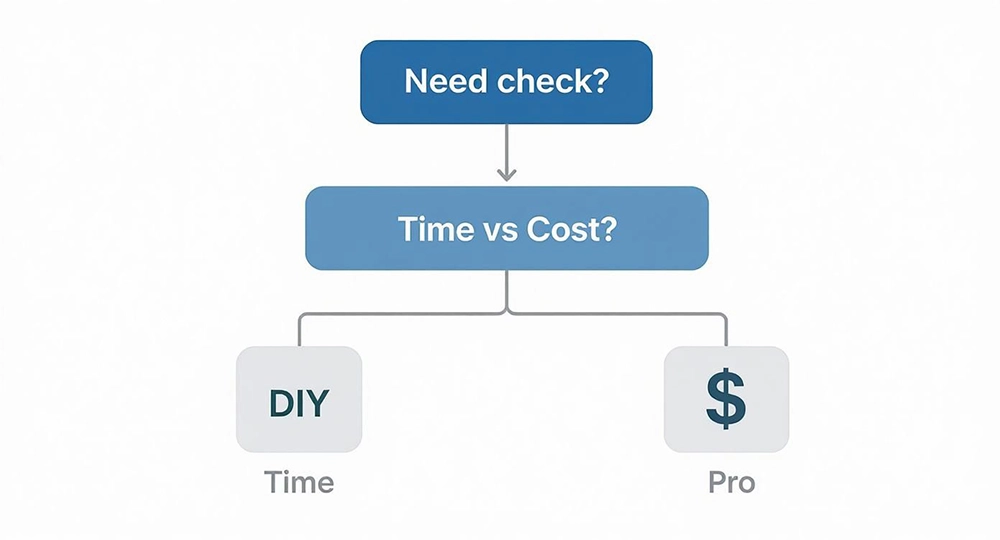A tenancy reference check is a landlord's single most important risk management tool. It's the process of verifying a potential tenant's reliability, financial stability, and past rental behaviour. This isn't just a box-ticking exercise; it's a deep dive into an applicant's background to make sure they're a good fit for your property. Firstly though, you need to find a tenant for your room to rent. Register as a landlord and begin your search with RoomsForlet.
Why a Tenancy Reference Check Is Your First Line of Defence

Imagine handing over the keys to one of your most valuable assets based on nothing more than a gut feeling. That’s essentially what you’re doing if you let a property without a thorough check. A solid referencing process is your first—and best—line of defence against the things that give landlords sleepless nights: rent arrears, property damage, and drawn-out, expensive eviction proceedings.
It’s an investigative process, pure and simple. It’s designed to give you a clear, evidence-based picture of who you're about to sign a contract with.
This isn’t about being difficult or nosy; it’s just good business. I can tell you from experience that the time you put into a proper, diligent check pays for itself many times over by preventing future headaches. You're laying the groundwork for a secure and positive tenancy from the get-go.
The Core Components of Referencing
To give you a quick overview, a comprehensive check is built on a few key pillars. Each one gives you a different piece of the puzzle about your applicant.
| Check Component | Purpose |
|---|---|
| Credit History | Reveals financial responsibility, highlighting any County Court Judgements (CCJs) or a history of missed payments that could signal a risk. |
| Employment & Income | Confirms the applicant has a stable job and can comfortably afford the rent, which is the bedrock of a sustainable tenancy. |
| Previous Landlord Feedback | Uncovers crucial information about a tenant’s behaviour, like their payment history and how they maintained their last property. |
| Right to Rent Status | A mandatory legal check in England to confirm the applicant has the legal right to rent a residential property in the UK. |
Each of these checks is crucial for building a complete picture of the applicant.
Skipping any of these steps leaves you exposed. A fantastic credit score means very little if a previous landlord tells you about significant property damage. Likewise, a glowing reference is useless if the applicant can't legally rent in the UK.
This isn't just my opinion; it's standard practice across the industry. Data shows that around 75% of UK landlords now conduct reference checks before signing a tenancy agreement, which shows a widespread understanding of its importance.
Ultimately, the goal is to find reliable people who will treat your property with respect. For a deeper dive, you might find this complete guide on how to find good tenants useful as it builds on these core principles. You can also find more helpful landlord advice over on the https://www.roomsforlet.co.uk/blog/.
Gathering the Right Information from Applicants

The success of your reference checks hangs entirely on what you ask for right at the start. It’s a classic case of garbage in, garbage out. A vague or poorly thought-out application form is guaranteed to leave you with gaps, making it impossible to piece together a clear picture of who you're dealing with.
Your mission is to get every crucial detail on paper from day one. Think of the application form not as a formality, but as the foundation for your entire vetting process.
Designing an Effective Application Form
Your application form is your primary intelligence-gathering tool. It needs to be structured to pull specific, verifiable facts that will feed directly into your checks. Skimp on this, and you’ll be chasing information for days.
As a bare minimum, make sure your form has clear sections for:
- Full Personal Details: Their complete legal name, date of birth, current address, phone number, and email. No nicknames.
- Address History: You need at least the last three years of addresses. Crucially, you also need the landlord or letting agency's contact details for each one.
- Employment History: Get their current employer's details, job title, salary, and the contact info for HR or a line manager. If they’ve been in their current job for less than six months, it's smart to ask for their previous employer's details too.
- Proof of Income: Be upfront that you’ll need to see evidence. State clearly that you'll require recent payslips or bank statements to back up their stated income.
This approach ensures you have all the puzzle pieces ready before you even think about verification. For landlords wanting to simplify this whole stage, you can find and manage applicants efficiently by advertising your room for free on a purpose-built platform.
From Collection to Verification
Getting the form filled out is just the first step. The real work is in the verification. You'd be surprised how often little discrepancies pop up between what's on the form and what the evidence shows. This is where a sharp eye pays dividends.
For instance, never just take payslips at face value. A vital check is to cross-reference them with bank statements. Does the net pay amount landing in their bank account actually match what’s printed on the payslip? It’s a simple comparison that can instantly flag doctored documents.
Pro Tip: When checking identity, always insist on seeing an official photo ID like a passport or driving licence. Meticulously compare the name and date of birth against their application. Even a small inconsistency can be a massive red flag.
A Template for Contacting Referees
How you ask for information is just as important as what you ask. When you reach out to referees, especially previous landlords, a generic, lazy email often gets a vague, unhelpful reply. I’ve learned over the years that a direct, well-structured message gets much better results.
Here’s a straightforward email template I’ve tweaked and perfected:
Subject: Tenancy Reference Request for [Applicant Name]
"Dear [Referee Name],
[Applicant Name] has applied to rent a property from me at [Property Address] and has listed you as a referee. To help me process their application, could you please confirm the following details about their previous tenancy at [Previous Address]?
- Tenancy dates (start and end)
- Final monthly rent amount
- Were there any consistent late rent payments?
- Was the property left in good condition?
- Would you happily rent to them again?
Your honest feedback is greatly appreciated and will be kept confidential.
Thank you for your time.
Kind regards,
[Your Name]"
This template is professional, gets straight to the point, and focuses on the questions that really matter. It helps you build a true picture of the applicant's reliability far better than a simple "were they a good tenant?" ever could.
Getting Real Insights from Employers and Past Landlords

Once you've got the application form and their documents, it’s time to turn that paper trail into a real-world picture. This is where you actually speak to people who can tell you what your applicant is like as an employee and, crucially, as a tenant.
This step separates a quick, tick-box check from a truly thorough one. Simply verifying the numbers isn't enough; you need to read between the lines.
Speaking with Employers
When you contact an applicant's employer, you're looking for more than just a salary confirmation. What you really want to know is how stable that income is. A big salary on a three-month contract carries a completely different level of risk compared to a lower but permanent one.
HR departments are often snowed under, so my advice is to be polite, direct, and know exactly what you need to ask. I've found it's best to stick to the key points:
- Can you confirm their job title and start date?
- Is the position permanent, temporary, or a fixed-term contract?
- Is their gross annual salary £[Amount] as stated?
For self-employed applicants, the process is a little different. With no HR department to call, you’ll need official documents. Ask for their last two years of SA302 forms from HMRC, which show their declared income for tax purposes. Another solid alternative is a formal letter from their chartered accountant confirming their recent earnings.
Questioning Previous Landlords
This is, without a doubt, the most valuable part of any reference check. A previous landlord’s feedback is a direct window into how your applicant will likely behave in your property. Don't just ask, "Were they a good tenant?". It’s too vague and just invites a simple "yes".
My go-to question is always, "Would you rent to them again?" The hesitation—or the enthusiasm—in their response often tells you everything you need to know. It’s a powerful question that cuts through polite, non-committal answers.
You need to dig a bit deeper with specific questions to get the full story:
- Did they consistently pay their rent on time and in full?
- Were there any deductions from their security deposit when they left?
- Did you ever receive complaints about them from neighbours?
- How was the property's condition when they moved out, allowing for fair wear and tear?
The answers to these questions give you a much clearer sense of risk than a credit score ever could. Tenant deposit protection schemes have made this feedback more reliable, as disputes are now formally managed. Data from the Office for National Statistics and findings from the private landlord survey also show that a lot of rental data comes from professional sources, which helps improve overall accuracy in the market.
Spotting a Fake Landlord Reference
Unfortunately, it happens. An applicant might get a friend to pose as their previous landlord to give a glowing reference. But there's a brilliantly simple way to protect yourself from this.
Before you even pick up the phone, head to the HM Land Registry online service. For a small fee (currently £3), you can check who the registered owner of the applicant’s previous address is.
If the name on the registry doesn’t match the name of the referee they’ve given you, you've just spotted a massive red flag without having to ask a single question. It's a small step that adds a huge layer of security to your referencing process.
Staying Compliant with UK Landlord Laws
Running a thorough tenancy reference check is a cornerstone of good landlording, but doing it by the book isn't just important—it's non-negotiable. The legal framework around lettings in the UK is there to protect everyone involved, and tripping up can lead to some serious penalties.
But don't think of the law as a set of traps. It’s actually a clear structure for managing your tenancies properly, right from the first handshake. Getting this right from the very beginning builds a solid foundation for a successful, stress-free tenancy.
Right to Rent: The Unmissable First Step
Before you even start thinking about affordability or what their last landlord said, there’s a massive legal hurdle you have to clear: the Right to Rent check. This is a mandatory legal duty for landlords in England, and getting it wrong can result in unlimited fines or even prison time. Seriously.
The check is all about verifying that any adult planning to live in your property has the legal right to be renting in the UK. This means you have to physically check their original identity documents with them present, or use a certified Identity Service Provider (IDSP).
Here’s what you absolutely must do:
- Check original documents: You need to see the real deal – passports, biometric residence permits, or other approved ID. A photocopy just won't cut it for the initial check.
- Verify authenticity: Do the documents look genuine? Does the photo and date of birth match the person standing in front of you? It sounds basic, but it's a critical step.
- Keep records: Make copies of the documents you’ve checked and keep them safe for the entire tenancy, plus one year after it ends.
And a quick heads-up: if your tenant has a time-limited right to rent, you're legally on the hook for conducting follow-up checks. Make sure you get those dates in your diary so you don't fall foul of the rules down the line.
Navigating GDPR and Data Protection
The moment you take an applicant's information, you become a 'data controller' under the General Data Protection Regulation (GDPR). This is a fancy way of saying you have a legal duty to handle their personal data securely and with respect.
Your responsibility under GDPR is simple: only collect what you need, keep it secure, and delete it when you no longer have a lawful reason to hold it. Treat your applicant's data with the same care you would expect for your own.
It's all about being transparent. Tell applicants why you're collecting their data and how you'll use it. Always get their explicit permission before you go running credit checks or phoning up referees. Store all their paperwork securely, and when you no longer need it for legal or tax reasons, make sure it’s destroyed properly.
For a deeper dive into your responsibilities, you can explore the various guides and articles in our landlord resources section: https://www.roomsforlet.co.uk/resources/.
The Impact of the Tenant Fees Act
One of the biggest shake-ups in recent years was the Tenant Fees Act 2019. This piece of legislation made it illegal for landlords or letting agents in England to charge tenants for tenancy reference checks. Plain and simple, the cost is now yours to cover.
The change was brought in to stop tenants from being hit with unfair upfront costs just to secure a home. You can find more insights about tenant referencing changes on totallandlordinsurance.co.uk. This shift makes it more crucial than ever for landlords to have an efficient and cost-effective referencing process in place.
What About Using a Professional Referencing Service?
Conducting a thorough tenancy reference check yourself is entirely possible, but let's be honest—it takes a lot of time and a sharp eye for detail. For many landlords, especially if you're managing more than one property or just have a busy life, outsourcing this critical task to a professional referencing service is a genuinely smart move.
These agencies specialise in one thing: vetting potential tenants quickly and comprehensively. They have polished systems and direct lines to credit databases that individual landlords simply can’t match. This means they can often get a full report back to you within 24 to 72 hours—a speed that’s almost impossible to achieve when you’re stuck waiting for referees to call you back.
But this isn’t just about saving a bit of time; it's about the sheer depth of the information you get. Professional reports dig much deeper than you can on your own.
What to Expect From a Professional Report
A report from a reputable referencing company is a goldmine of verified information. It pulls all the key checks together into a single, easy-to-read document. You're essentially paying for their expertise and their access to otherwise hidden data.
Key features usually include:
- A Detailed Credit Check: This will flag any active or recent County Court Judgements (CCJs), bankruptcies, or individual voluntary arrangements (IVAs).
- An Affordability Score: The service calculates an affordability ratio based on the tenant's verified income against the proposed rent, giving you a straightforward pass or fail.
- Previous Landlord Verification: They’ll get in touch with the previous landlord to ask those crucial questions about rent payments, the property's condition, and whether they’d happily rent to them again.
- Employment Confirmation: The agency will contact the applicant's employer directly to confirm their salary, job title, and the permanence of their position.
The real value, though, is in the consolidated verdict. Good services provide a clear recommendation—like 'Accept,' 'Accept with Guarantor,' or 'Decline'—based on all the combined data. This removes the guesswork and gives you a solid, evidence-based foundation for your decision.
Choosing the Right Service for You
When you're picking a referencing company, cost is obviously a factor, but it shouldn't be the only one. Prices can range anywhere from around £15 to £30 per applicant. My advice is to look for a company that’s well-regarded in landlord circles and provides a sample report so you can see exactly what you'll be getting for your money.
Think about whether the service is a good fit for what you actually need. The table below breaks down the main differences between going it alone and hiring the pros.
DIY vs Professional Referencing Service
| Feature | DIY Referencing | Professional Service |
|---|---|---|
| Speed | Can drag on for 3-7 days, depending entirely on how quickly referees respond. | Typically 24-72 hours thanks to their automated systems and dedicated teams. |
| Data Access | You're limited to public records and whatever information the referees are willing to share. | They have direct access to credit bureaus for a full financial history. |
| Cost | Minimal financial cost upfront, but a very high investment of your own time. | A fixed fee per applicant, which the landlord usually covers. |
| Objectivity | It's easy to be influenced by your personal impression of the applicant. | You get an impartial, data-driven recommendation, free from bias. |
Ultimately, using a professional service is all about managing risk and getting your time back. For landlords who want that extra peace of mind and a faster, more thorough check, it’s an investment that pays for itself by helping you secure a reliable, long-term tenant.
Common Referencing Questions Answered
Even the smoothest referencing process can throw up a few curveballs. Sooner or later, you’ll face a tricky situation or a question you’re not sure how to answer. Knowing how to handle these common scenarios is key to making fair, consistent, and legally sound decisions for your property.
This decision tree visualises that first choice you have to make: doing the checks yourself or bringing in the professionals. Your priorities will usually point you in the right direction.

As you can see, if time is your most precious resource and you're comfortable with the legwork, a DIY approach can work well. But if you’re looking for the most comprehensive data without sacrificing your own time, a professional service is almost always the better path.
What to Do If an Applicant Fails the Check
First off, don't just look at the 'fail' result – dig into the why. Was it a minor credit blip from five years ago or a borderline affordability calculation? For these less serious issues, you have options. A common solution is to ask for a UK-based guarantor, who you would then need to reference just as thoroughly as the applicant.
However, if the failure is down to major red flags like active County Court Judgements (CCJs), a recent history of evictions, or a damning reference from their last landlord, it’s usually wisest to politely decline their application. Just be sure you apply your criteria consistently to every single applicant to avoid any hint of discrimination.
How to Reference Students or First-Time Renters
When you’re dealing with applicants who have no rental history – think students or young professionals leaving home for the first time – the standard approach is to require a guarantor. This is nearly always a UK homeowner with a stable, verifiable income.
You must perform a complete reference check on the guarantor with the same rigour you would for the tenant themselves. This includes credit, employment, and affordability checks.
For students, you can also ask for proof of their university enrolment and evidence of their funding. This could be their student loan award letter or confirmation of any bursaries. The goal is simple: get a solid financial guarantee when a traditional rental history just isn't there.
Can You Reject Someone Based on Their Credit Score?
In short, yes, you can – as long as this standard is applied uniformly to every single person who applies. A low credit score can be a legitimate indicator of financial risk, and you are well within your rights to set a minimum threshold.
Context is everything, though. A low score caused by a single, resolved issue from years ago is a world away from a recent and ongoing pattern of defaults. While you aren't legally required to give a specific reason for rejection, your internal decision-making must always be lawful and non-discriminatory.
How Long Does a Tenancy Reference Check Take?
The timeline can really vary. Using a professional referencing service is by far the quickest route, often delivering a full report within 24 to 72 hours. They have the systems and direct access to credit databases to get it done fast.
If you’re doing the checks yourself, be prepared for it to take a bit longer – typically somewhere between three to seven days. The biggest hold-up is almost always waiting for employers and previous landlords to get back to you. Don't be afraid to send a polite follow-up email or make a quick call after a day or two; it can often speed things along nicely.
Finding the right tenant starts with getting your property seen by the right people. With Rooms For Let, you can advertise your spare room or HMO property to thousands of active searchers across the UK, helping you fill vacancies quickly and efficiently. Find your next tenant on Rooms For Let today.